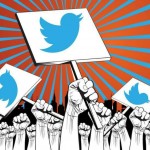 I wrote recently about a Finnish study that set out to investigate how arguments unfold on Twitter. Their central thesis was that arguments have a unique conversational structure that marks them out as different, and therefore possible to spot.
I wrote recently about a Finnish study that set out to investigate how arguments unfold on Twitter. Their central thesis was that arguments have a unique conversational structure that marks them out as different, and therefore possible to spot.
After studying a range of both controversial and benign conversations, the team identified a number of emerging trends. For instance, in controversial topics, retweet and follow graphs would reveal clusters of users that suggest a polarized debate forming.
Of course, few topics are quite so prone to invoke anger and outrage as politics. A recent study by NYU’s Social Media and Political Participation Lab highlights just how combustible it can be.
Politics on Twitter
“Platforms like Twitter or Facebook are creating unprecedented opportunities for citizens to communicate with their peers about current events,” the authors say. “The conventional wisdom is that these environments exacerbate social extremism and political polarization, but we find that online communication structures are really flexible and situation-specific.”
The study’s foundations were in a new method that allows a users ideological position to be accurately gauged, and to then carry that forward to see how this is reflected in their subsequent online conversations.
The researchers analyzed the structure and content of conversations on Twitter about political issues, whether it’s the state budget or presidential campaigns. They compared these with non-political issues such as the Super Bowl. All told, it involved some 150 million tweets.
Users political leanings could be reasonably determined by the network they were in. Fake accounts were weeded out of the sample, leaving some 3.8 million active users that the researchers could examine.
Social echo chamber
As might be expected, for overtly political discussions, most people communicated with those whose opinions matched their own. It wasn’t a complete echo chamber however, with at least some divergent thinking filtering through.
“To some extent, social media platforms can promote democratic deliberation and the exchange of ideas from different perspectives,” the authors say. “Even for the most divisive topics, such as the 2012 presidential election, we did not see a perfect division on Twitter – while people may encounter political views that they agree with, they’ll encounter divergent opinions as well.”
The rate of polarization
The analysis also revealed how quickly things can descent into partisan oneupmanship. For instance, initial tweets around the shooting at Newtown elementary school were nonpartisan. They quickly descended into partisan and polarized tweets around gun control however.
The degree of information sharing differed noticeably between liberals and conservatives. Liberals were more likely to share information from conservatives than the other way round.
“Of the twelve issues we examined, there was only one (the 2014 Winter Olympics) for which liberals and conservatives were equally likely to retweet across ideological lines,” the authors reveal.
They go on to suggest that their findings will be important in our ability to measure the ideological positions of large quantities very quickly, which may have a big impact on how we study social and political attitudes.
I try and stay as clear of Twitter for that kind of thing as possible. Facebook too if I'm honest.
I don't blame you one bit Paul.
They unfold like a car crash I suspect.